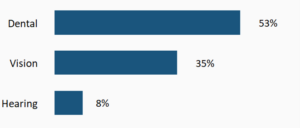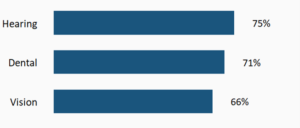By Alex Moore
Despite making cuts to other government agencies and services, the new administration has vowed to protect Medicare and Social Security. It has also, primarily through new Health and Human Services Secretary Robert F. Kennedy Jr., who has called to “Make America Healthy Again” by reducing chronic diseases.
Want to know one of the best opportunities to accomplish both goals at once? Addressing Medicare’s failure to cover “supplemental” care. This includes dental, vision, and hearing. Although there would be an upfront cost to the expanded coverage, it would substantially improve many seniors’ quality of life while also creating improved downstream health outcomes that would lower costs for American taxpayers in the long run.
Two bills introduced this March—one in the House and the other in the Senate—would make it so Medicare covers dental, vision, and hearing. “This expanded care could help prevent cognitive impairment and dementia, worsened chronic disease, and imbalance leading to falls with deadly consequences,” said Representative Lloyd Dagget, who introduced the House version of the bill, in a statement. “This is an essential step to fulfilling the original promise of Medicare—to assure dignity and health for all.”
Many Seniors Currently Go Without Dental, Hearing, and Vision Care
The most recent data, from a 2021 research study by the non-profit Kaiser Family Foundation, shows that many seniors struggle to access supplemental care. As shown in Figure 1, it is estimated that only about half of Medicare beneficiaries see a dentist each year. Only 35 percent see an eye doctor, and only 8 percent see a hearing specialist.
Figure 1:
Medicare Beneficiaries Who Received Care in the Last year
Low usage of supplemental care isn’t driven by a lack of need. The study found that 83 percent of beneficiaries need eyeglasses or contact lenses, and 65 percent struggle with hearing difficulties. The biggest problem was the cost. On average, beneficiaries who did use supplemental services paid an annual average of $914 for hearing care, $874 for dental care, and $230 for vision care. As shown in Figure 2, among beneficiaries who hadn’t accessed supplemental care, 75 percent said cost was a barrier to getting hearing care, 71 percent said it was a barrier to dental care, and 66 percent said it was a barrier to vision care.
Figure 2:
Percentage of Beneficiaries Who Didn’t Get Care due to Cost Barriers
So, we don’t really have to say much more here. American seniors are clearly missing out on important dental, vision, and hearing care since they can’t afford it because Medicare fails to cover these services. The obvious next question is this: What would change if they were covered?
Supplemental Coverage Through Medicare Would Broadly Improve Seniors’ Health
A healthy mouth, eyes, and ears all have an important impact on seniors’ lifespans. According to a study from the Journal of the American Heart Association, gum infections and periodontal disease increase the likelihood of premature death by 12 percent. Another study published in the Lancelet Longevity Journal finds that, among adults with hearing loss, those who use hearing aids have a 24 percent lower mortality rate.
What’s more, research shows that reducing dental, vision, and hearing issues can reduce the risk of other chronic diseases that reduce seniors’ quality of life, such as:
- cardiovascular disease
- diabetes
- dementia
- hypertension
- vertigo and balance issues
- depression and anxiety.
Granting seniors access to dental, vision, and hearing care through Medicare could extend their lives, mitigate the risk of chronic diseases that greatly reduce their quality of life, and serve as preventative care that reduces the need for healthcare interventions that solve problems once they’ve already gotten bad, which tend to be more expensive.
TSCL, Like Most Americans, Supports Expanded Care
According to a 2024 study from the think tank Data for Progress, 92 percent of Americans support expanding Medicare to provide dental, vision, and hearing benefits, while only 5 percent oppose doing so. This support held across the political spectrum, with similar percentages reported for Democrats, Republicans, and independent voters.
At TSCL, we call on the current administration to fulfill its “Make America Healthy Again” promise by working across the aisle to make this happen. American seniors deserve access to comprehensive medical care, and providing it to them will extend their lives, reduce chronic disease, and, in the long run, save money for taxpayers.


